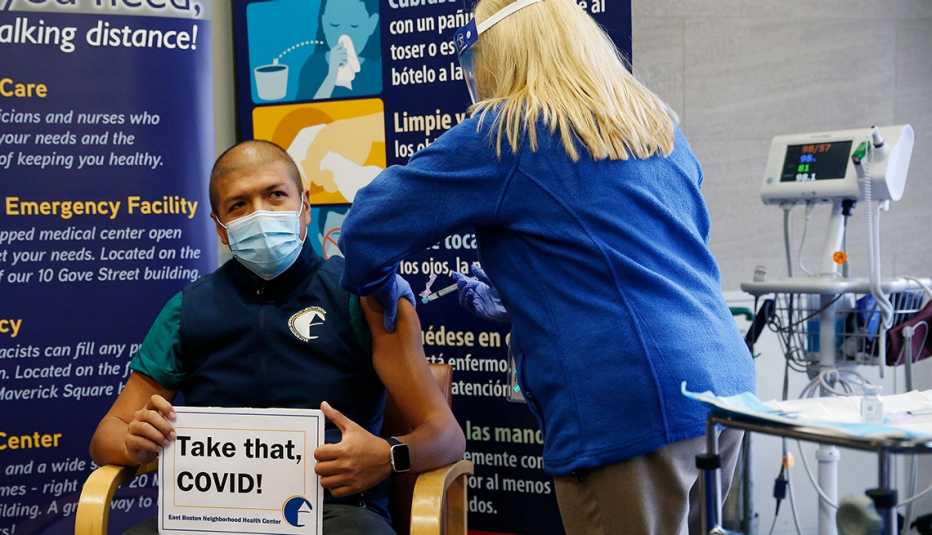AARP Hearing Center
Soon it will be possible to take a COVID-19 test and get results in minutes — all without leaving your house.
The Food and Drug Administration (FDA) has given the green light to five COVID-19 rapid tests that deliver results in real time at home, including four that will be sold over the counter without a doctor's prescription.
For months, consumers have been able to purchase test kits that allow them to collect a sample at home and mail it to a lab. But those kits typically cost more than $100, and patients have to wait a few days for the results.
The new at-home coronavirus tests are different because they're less expensive, more convenient and deliver results on the spot. Even though vaccination has started, public health experts say at-home tests are an important tool for helping slow the virus over the next few months until most Americans have the opportunity to get the vaccine.
The FDA has said the tests are a key tool for schools, workplaces and communities to use to quickly screen people for COVID-19 during the pandemic.
"COVID has turned out to be so difficult to control because so much of its transmission happens from people who don't know they're infected,” said Mark McClellan, M.D., director of the Center for Health Policy at Duke University and former FDA commissioner. “The faster, easier and cheaper we can make it to find out if you're infectious, the better."
Here are the answers to some common questions about the new at-home tests.
What are the different types of at-home tests?
So far, the FDA has given what's called emergency use authorization (EUA) to five at-home tests. That means the tests haven't gone through the full rigorous FDA approval process, but the agency wanted to get them on the market quickly due to the severity of the pandemic. The tests are:
- Ellume's COVID-19 Home Test: This was the first at-home test to be authorized that can be done without a prescription. It uses so-called antigen technology, meaning it looks for fragments of viral proteins. On Feb. 1, the federal government announced a $231.8 million deal to boost manufacturing of the test. The company is working with retailers to get the test on store shelves, a spokeswoman said, and it will also be sold online. It will cost about $30. The test delivers your results wirelessly to a smartphone app in 15 to 20 minutes.
- Abbott's BinaxNOW COVID-19 Antigen Self Test: This rapid antigen test has been used for months by health care providers, but on March 31, the FDA authorized it to be sold over the counter and used at home, even by those who have no symptoms. The test will be sold in packs of two, and the instructions call for it to be administered twice over three days. Repeat testing helps reduce the chance of inaccurate results. In a March 31 press release, Abbott said the test will be available “in coming weeks” on drugstore and grocery store shelves. Results are delivered in about 15 minutes on a device the size of a credit card.
- Quidel’s QuickVue At-Home OTC COVID-19 Test: This is another antigen test that will be sold over the counter. Like the one from Abbott, it will be sold in packs of two, and the instructions call for users to test themselves twice over two or three days, with at least 24 hours between tests. Results are delivered on a paper test strip that changes color in 10 minutes, similar to a home pregnancy test.
- Cue’s COVID-19 Test for Home and Over the Counter Use: This test is also authorized to be sold over the counter without a prescription, but it uses molecular technology, which can pick up very small amounts of genetic material. Molecular tests are generally more accurate than those that use antigen technology, especially in patients who are asymptomatic. Results are available in about 20 minutes. Cue Health cofounder and chief product officer Clint Sever said the company is working to make the test available at retailers nationwide, but he did not have a time frame. The company has yet to set a price for the test.
- Lucira's COVID-19 All-In-One Test Kit: Like the Cue test, the Lucira one uses molecular technology. It is priced at $50, and you need a prescription to use it. Lucira is selling the test directly to health care providers; a spokesman says your doctor can order it for you. It takes about 30 minutes to deliver results.
How accurate are the tests?
Data submitted to the FDA for all of the four tests shows high accuracy rates – above 80 percent — but testing experts noted that their effectiveness in the real world will likely be lower due to user error and other factors.
"When manufacturers are preparing data to submit to FDA, they are conducting studies under very specific, highly controlled conditions that optimize the performance of the test,” said Kelly Wroblewski, director of infectious disease programs at the Association of Public Health Laboratories.




































































